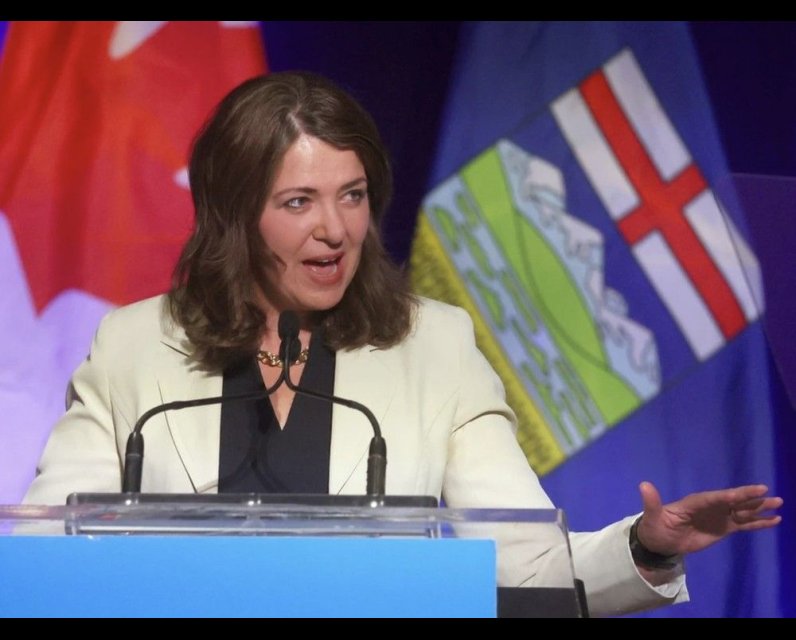Source Feed: National Post
Author: Rahim Mohamed
Publication Date: May 8, 2025 - 16:17
Newfoundland echoes Danielle Smith's call to fix equalization
May 8, 2025

OTTAWA — Alberta Premier Danielle Smith is putting a new twist on an old debate over equalization, saying that the federal program should be re-tooled to prioritize the smaller provincial economies like those in Atlantic Canada.
At least one Atlantic province, Newfoundland and Labrador, agrees that it’s getting shortchanged under the program’s current rules.
“(E)
qualization is intended to ensure … fairness for all citizens. Currently, this fairness is not achieved for Newfoundland and Labrador,” Greg Gill, a spokesperson for Newfoundland’s Liberal government told the National Post on Thursday.
Smith said in a livestreamed address on Monday that it was time for the ‘big four’ provinces of Ontario, Quebec, Alberta and British Columbia to fend for themselves, and stop siphoning equalization dollars from smaller provincial economies like those in Atlantic Canada.
“We have no issue with Alberta continuing to subsidize smaller provinces with their needs, but there is no excuse for such large and powerful economies… to be subsidizing one another,” said Smith.
“That was never the intent of equalization, and it needs to end.”
Newfoundland’s government likewise says the program shortchanges its residents in a number of ways, including by failing to account for the cost of delivering services in the far-flung, sparsely populated province.
“(We) service… more than 500 communities across a large, geographically dispersed, and aging population connected by almost 10,000 kilometres of roads,” wrote Gill.
Gill also said the current equalization formula punishes Newfoundland for developing offshore oil and other natural resources. He did not say explicitly that Newfoundland agree with Smith that the four biggest provincial economies should stop subsidizing one another through the equalization program.
Newfoundland
filed a court challenge
against the program in June 2024, arguing it doesn’t fulfill its constitutional purpose in its current form.
Smith said
in a March statement
to the federal party leaders that Alberta “is no longer agreeable to subsidizing other large provinces who are fully capable of funding themselves.”
Sixty-two per cent of Albertans
voted in a 2021 referendum
to petition Ottawa to remove equalization from the Constitution, after the question was put forward by
a panel on constitutional issues
launched by Smith’s predecessor Jason Kenney.
Quebec and Ontario will take in a combined $14.15 billion of
$26.17 billion earmarked for equalization
payments in 2025-26, with Quebec alone getting half the total pot ($13.57 billion).
Smith called on Monday for Alberta to receive
federal transfers and equalization payments
on the same per capita basis as the other three large provinces.
Alberta hasn’t received equalization payments since the mid-1960s but still gets annual federal health and social transfer payments.
It will get $8.6 billion in major federal transfers in 2025-26, or $1,695 per person.
This is $1,464 less per person than Quebec, $33 less than Ontario and the same as B.C
.
Trevor Tombe, a professor of economics at the University of Calgary, said that size can be misleading in discussions of economic redistribution.
“China is a much bigger economy than Canada, but is the average Chinese person better off than the average Canadian?” said Tombe.
Tombe pointed out that the three Maritime provinces of Nova Scotia, New Brunswick and Prince Edward Island will be paid out on a higher per-capita basis than Quebec.
He conceded that there are “legitimate concerns” that arise when have-not provinces deliberately make economically suboptimal choices, such as putting in place bans on resource development.
“One question we’ll have to grapple with is should we have a program that provides larger payments to provinces that make decisions that hurt their own economy?” said Tombe.
Tombe noted that equalization payments have helped Quebec keep its
electricity prices artificially low
, hampering innovation and growth in the province’s energy sector.
He also noted that the no-strings-attached payments can inflame interprovincial tensions when have-not provinces appear to spend frivolously.
Ontario, for example, is set to receive $546 million in equalization payments this year,
after spending roughly $3 billion
on pre-election rebate cheques for residents.
National Post
rmohamed@postmedia.com
Get more deep-dive National Post political coverage and analysis in your inbox with the Political Hack newsletter, where Ottawa bureau chief Stuart Thomson and political analyst Tasha Kheiriddin get at what’s really going on behind the scenes on Parliament Hill every Wednesday and Friday, exclusively for subscribers. Sign up here.
Our website is the place for the latest breaking news, exclusive scoops, longreads and provocative commentary. Please bookmark nationalpost.com and sign up for our daily newsletter, Posted, here.
A driver who has racked up 32 driving prohibitions or suspensions, as well as 16 24-hour driving bans, failed to convince a British Columbia judge he should get a lighter sentence than normal for drunk driving because more than six months in jail could get him deported to India.
Vernon’s Gurinder Pal Singh Bajwa, a permanent resident of Canada who escaped deportation in 2019 on an impaired driving conviction with a sentence of five months and 29 days, got a reduced sentence this time around because Mounties
captured him...
June 7, 2025 - 07:00 | Chris Lambie | National Post
For more than three decades, Barrie Sketchley has led Rosedale Heights, an art-focused high school near Toronto’s tony Rosedale-Moore Park neighbourhood.
Now more than 80 years old, Sketchley’s fate will be decided on Monday when the board of trustees votes to approve — or reject — suggestions on principal assignments made by Toronto District School Board (TDSB) staff. Sketchley is expected to be forced to leave the school he helped build into something students and parents say is pretty special. And they are outraged and upset, racing against the clock to save his job. This is all...
June 7, 2025 - 07:00 | Tyler Dawson | National Post
I deas move in space and time. They swim like fish. They drift like pollen. They migrate like birds. Sometimes their movement carries them right around the world, and they find new niches in which to flourish.
One day in October 1971, a young academic called Christopher Stone was giving a seminar on property law at the University of Southern California in Los Angeles. It had been an intense class; the students were tired and distracted. Pens were being twirled, windows stared out of. Stone decided to have a last shot at regaining their interest. What he said then jolted the students...
June 7, 2025 - 06:30 | Robert Macfarlane | Walrus




Comments
Be the first to comment